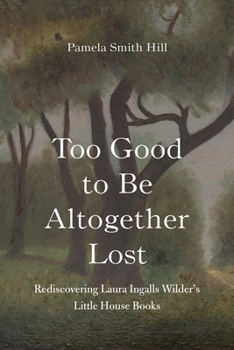Too Good to Be Altogether Lost: Rediscovering Laura Ingalls Wilder's Little House Books
Laura Ingalls Wilder, author of the well-known Little House series, wrote stories from her childhood because they were "too good to be altogether lost." And those stories seemed far from being lost during the remainder of her lifetime and through most of the twentieth century. They were translated into dozens of languages; generations of children read them at school; and dedicated readers made pilgrimages to the settings of the Little House books. With the release of NBC's Little House on the Prairie series in 1974, Wilder was well on her way to becoming an international literary superstar. Simultaneously, however, the novels themselves began to slip from view, replaced by an onslaught of assumptions and questions about Wilder's values and politics and even about the books' authenticity. From the 1980s, a slow but steady critical crescendo began to erode Wilder's literary reputation. In Too Good to Be Altogether Lost, Wilder expert Pamela Smith Hill dives back into the Little House books, closely examining Wilder's text, her characters, and their stories. Hill reveals that these gritty, emotionally complex novels depict a realistic coming of age for a girl in the American West. This realism in Wilder's novels, once perceived as a fatal flaw, can lead to essential discussions not only about the past but about the present--and the underlying racism young people encounter when reading today. Hill's fresh approach to Wilder's books, including surprising revelations about Wilder's novel The First Four Years, shows how this author forever changed the literary landscape of children's and young adult literature in ways that remain vital and relevant today.
Format:Hardcover
Language:English
ISBN:1496227883
ISBN13:9781496227881
Release Date:July 2025
Publisher:University of Nebraska Press
Length:344 Pages
Customer Reviews
0 rating





